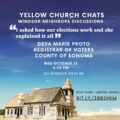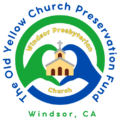What if I told you that a destructive event or the end of the world or an invasion of zombies is actually not what “apocalypse” actually means at all when we talk about the Bible. Apocalypse comes from the Greek meaning “revelation.” An apocalypse in the Bible happens whenever God reveals something to humankind – whether it be one, like Elijah on the mountain at Horeb, or Mary at the story we read at the candle lighting.
It can come with an angel bursting into your boudoir or a still small voice, a whisper of silence even, on the mountaintop. And it can come with signs in the sun and the moon and the stars and if you’re reading Mark’s gospel, which has a much more exciting version of “apocalypse” the sun turning red – or orange like we saw last October. Or it can come with John’s dream of the book of Revelation, where he saw a new heaven and new earth descending from the clouds.
But the most amazing apocalypse of all was what we will celebrate again in just over four weeks, when God revealed Godself not in fire or earthquake or angel messenger or even silence, but in the cry of a baby in a stable. “For God so loved the world that he gave his only Son, so that everyone who believes in him may not perish but may have eternal life. Indeed, God did not send the Son into the world to condemn the world, but in order that the world might be saved through him.”
God is not sending zombies to destroy us and the world God loves. God wants to save us – save us from ourselves really. That’s the revelation – the apocalypse we celebrate every year with our remembrance of the coming of Jesus each year.
But Christmas is not really what Advent is all about. In Advent we are preparing for something, but it’s not Jesus being born in a manger – that happened more than 2 millennia ago. How can we prepare for something that’s already happened? No we’re not preparing for an old apocalypse – and old revelation from God – we’re preparing for a new one – new ones! New encounters with the Divine, that may look like the ones we see happening to Mary and others in the Bible, but maybe some that look completely new and different too. We’re looking for special signs in the moon and the sun and the stars. We’re looking amid the death of winter to the new life of a fig tree – or a rose bush in your garden or a vine in the vineyard. And we’re looking among the death and despair of our world, what we see in the newspaper or on our streets or in our own families – we’re looking for the signs of new life, the revelation, the apocalypse of God’s love with us – Emmanuel, in whatever way we might experience it this new year.
Check out the whole sermon here.












